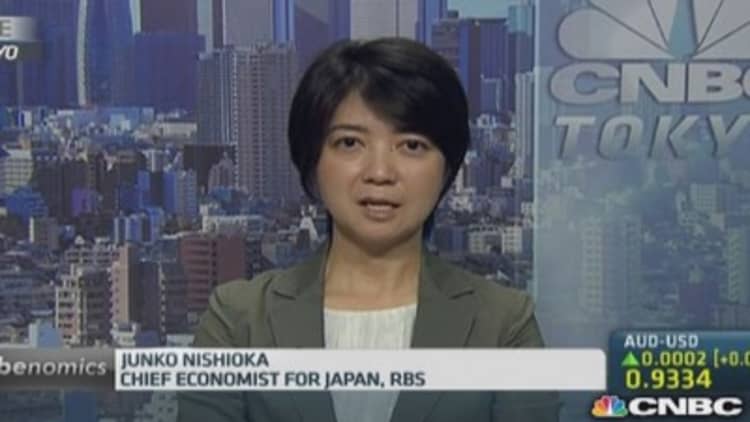Central banks will drive Thursday's agenda in Asia, with the Bank of Japan starting a two-day review and policy decisions due in Indonesia, South Korea, and New Zealand. Only one of the four is expected to take action, but experts are divided over the future course of action for each.
Indonesia
After delivering five successive rate hikes in 2013, Bank Indonesia (BI) is expected to keep its benchmark interest rates steady at 7.5 percent due to a widening trade deficit. In April, Indonesia posted a $1.9 billion trade deficit, reversing from a $673 million surplus in March, as exports contracted for a thirteenth consecutive month.
Inflation also remains a key factor. Consumer price inflation rose 7.32 percent in May, steady from April's 7.2 percent reading but well above the bank's 2014 target of 3.5 to 5.5 percent.
Six out of eight analysts polled by Reuters expect no change to the key interest rate through year end.
"With the spike in inflation, we think the central bank will likely keep its monetary policy stance tighter for longer. This is to minimize the risk of second-round effects and keep real interest rates sufficiently positive to avoid currency deprecation. As and when inflation moderates in 2015, we still think BI will surprise the market by cutting the policy rate more than most observers expect," said Santitarn Sathirathai, research analyst at Credit Suisse in a report published Monday.
South Korea
The Bank of Korea's (BOK) decision is due at 9am SIN/HK and while analysts widely forecast it will leave its base rate unchanged at 2.5 percent for the 13th straight month, there is some debate on the bank's next move.
Read MoreNo respite in sight for South Korean exporters
The majority of analysts surveyed by Reuters predict the central bank will hike rates by 25 basis points either late this year or in 2015, in line with comments from new Governor Lee Ju Yeol in March, who said households should prepare for higher interest rates.

However, Credit Suisse expects a more dovish stance: "Although the external and domestic economy has been gradually improving, headwinds may still arise over the trajectory of the recovery, in our view. The lack of imminent inflation risk and uncertainty over future growth path is likely to prompt the BOK to stay prudent and delay the commencement of the interest rate normalization process," it said in a report.
Persistently low inflation remains the BOK's main obstacle. In May, the consumer price index rose to a 19-month high of 1.7 percent on year, but that was still below the 2.5 to 3.5 percent target rate.
New Zealand
With two interest rate hikes under its belt this year, the Reserve Bank of New Zealand (RBNZ) is currently considered the world's most hawkish central bank. The consensus view for Thursday's meeting is for a 25 basis point cash rate hike to 3.25 percent after Governor Wheeler signaled more hikes at its April meeting.
However, Kathy Lien, managing director of FX Strategy at BK Asset Management, believe rates will remain unchanged due to a downturn in economic data. Apart from declines in consumer spending, manufacturing activity and housing growth, Lien notes that the economy's biggest problem is the collapse in dairy prices. Dairy constitutes a third of exports by value and prices are down over 20 percent since February.
Read MoreFlying Kiwi dollar to come 'down to earth'
"Under this backdrop it will be very difficult for the RBNZ to continue tightening. A pause would not only help the economy but would also drive the New Zealand dollar lower, an ideal outcome for a central bank that threatened to intervene in the foreign exchange market to weaken their currency in April," she said in a note on Tuesday.

Japan
No action is expected from the Bank of Japan (BOJ) at Friday's outcome as strong gross domestic product and capital expenditure data underscore the bank's confidence in the economic recovery. According to Kathy Lien, as long as data continue to improve, there will be no urgency to increase stimulus.
However, calls for fresh easing later this year are growing.
Read MoreBoJ won't act before October: Pro
Capital Economics expects fresh easing in October on the basis that inflation will fall short of the government's 2 percent target at year-end. The group highlights that three of the BOJ's nine board members said in April they did not believe the inflation target would be achieve by the projected time frame.
"The BOJ estimates that if the consumption tax hike is passed on in full, the CPI would rise by 2 [percentage points]. If we assume that the pass-through was complete in April, price pressure has already slowed sharply as the impact of the weak yen has faded. In our view it is only a matter of time before a majority of Board members acknowledge that inflation will miss the 2 percent target early next year," the group said in a report.

